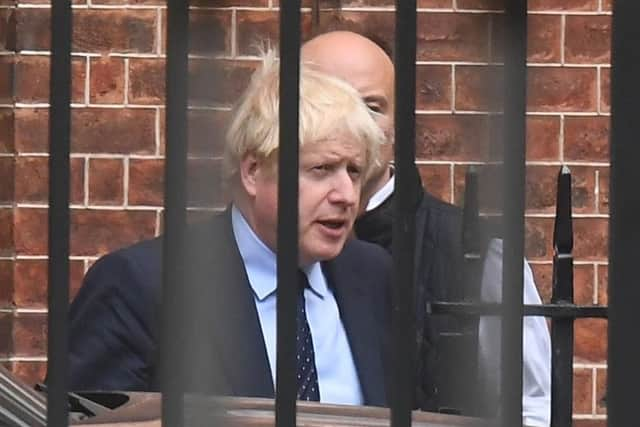'Seismic' changes planned by Boris Johnson and Dominic Cummings for civil service
Rachel Wolf, who helped draw-up the blueprint of Tory election pledges has claimed that civil servants are "woefully unprepared" for sweeping reforms the Prime Minister is keen to push through.
Writing in The Daily Telegraph, Ms Wolf said reported plans for merging, creating or abolishing departments are just a "tiny fraction" of the changes set to be implemented.
Advertisement
Hide AdAdvertisement
Hide Ad

She said the changes, set to begin in the spring after the UK is due to leave the EU at the end of the month, will end the "merry-go-round" of officials changing jobs every 18 months.
But she dismissed suggestions the civil service will be "politicised" under the reforms which the PM's special adviser Dominic Cummings is likely to have a big influence over.
Boris Johnson has already indicated potential sweeping changes in government departments, including removing responsibility for Britain’s borders and immigration system from the Home Office and placing it in a standalone department.
The Department for International Trade could be merged with the Department for Business, Energy and Industrial Strategy, climate change policy could be moved from BEIS into a new ministerial department, while the Department for International Development could be absorbed by the Foreign Office.
Other changes reportedly being discussed within government include giving the Prime Minister’s office more power and encouraging the recruitment of external experts into the civil service.
Today Ms Wolf said Mr Johnson wanted to run "the most dynamic state in the world". She said one of the biggest changes is likely to be in the area of Whitehall recruitment and training.
She stated that anyone staying in the same job for longer than 18 months is currently seen to have "stalled" in a culture that ensures "everyone rises to their position of incompetence".She also predicts that civil servants will be "reoriented to the public", rather than "stakeholders".
Many officials "cannot believe the Prime Minister and Dominic Cummings mean business", she writes, and "as a result, they seem woefully unprepared for what is coming".
Advertisement
Hide AdAdvertisement
Hide AdChanges to the civil service have been predicted since Boris Johnson hired the Leave campaign manager Dominic Cummings as an adviser.
Mr Cummings has long been a criitc of how the civil service functions, and was used as a source by the think tank Policy Exchange for its new briefing paper "Whitehall Reimagined", which recommended that the Prime Minister’s office and special advisers should lead fundamental reforms to "unlock the potential" of the civil service.
The think tank also warned that the civil service is under “unprecedented strain” and needs to modernise to face the challenges of a post-Brexit Britain.
Proposed reforms include a complete overhaul of the existing public appointments process to allow ministers to appoint their preferred candidates and prevent a majority of important public roles being handed to “ideological opponents.”
Another recommendation is a call for the restoration of extended ministerial offices, to improve policy making capacity for departmental ministers.
Policy Exchange also called for the creation of a dedicated ‘red team’ of “10-15 high calibre individuals” who would have “an explicit mandate to challenge received wisdom and critically examine new policy proposals in No. 10, Treasury and government departments.” The head of the Red Team would report directly to the Prime Minister’s chief of staff.
Such a proposal has been among Cummings’ recommendations for government reform.
The briefing paper also proposed changing recruitment and progression “to enhance expertise, accountability and institutional memory” and said public appointments should be made through “a more rigorous assessment of candidates both for experience and ability and to ensure their approach to their roles will align with that of the democratically elected government of the day" - a move which has been criticised as politicising the civil service, as special advisers could "veto" appointments.
Advertisement
Hide AdAdvertisement
Hide AdWriting in the foreword, Dame Patricia Hodgson, former chair of Ofcom, said: “This paper is designed not to overturn the civil service, but to strengthen it. The civil service can only deliver if we recruit the best, require the best and properly manage and reward the best.”
The Policy Exchange briefing also recommends merging the Department for International Development and the Department for International Trade into the Foreign and Commonwealth Office, and creating a Department for the Union to “provide a coherent voice within Whitehall, with the devolved governments and across the UK on union matters.”
However, responding to the report, Dave Penman, general secretary of the FDA, the union for managers and professionals in public service, described the briefing paper as seeking to “break the monopoly of advice from civil servants to ministers.”
He said: “Whether this is driven by ideological mistrust or a genuine attempt to improve the advice to ministers, it comes with a number of inherent dangers.”
Penman added: “The rehashing of Extended Ministerial Offices – increasing the number of political appointees around ministers – and the emphasis on greater external legal advice both smack of an ideological approach that seeks to dilute the role of the civil service.”
And moving to appoint advisers on the basis of their political persuasions “may be more likely to give the minister the advice they want rather than need, but that does not make for good government.”
